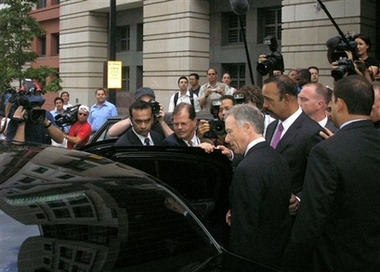Libby sentenced to 2 1/2 years in prison
(AP)Updated: 2007-06-06 10:11
WASHINGTON - Vice President Dick Cheney's former chief of staff was sentenced to 2 1/2 years in prison Tuesday for lying and obstructing the CIA leak investigation - the probe that showed a White House obsessed with criticism of its decision to go to war.
 Former White House aide I. Lewis 'Scooter' Libby, center, gets into his car outside federal court in Washington, Tuesday, June 5, 2007. [AP]  |
No date was set immediately for Libby to report to prison.
"Mr. Libby failed to meet the bar. For whatever reason, he got off course," said US District Judge Reggie B. Walton.
Special Prosecutor Patrick Fitzgerald, who spent years investigating the case, said, "We need to make the statement that the truth matters ever so much." He had asked for a sentence of up to three years, while Libby had asked for probation and no time in prison.
Reaction from the White House was still supportive - but somber.
President Bush, traveling in Europe, said through a spokesman that he "felt terrible for the family," especially Libby's wife and children. Libby and his wife, Harriet Grant, have two school-age children, a son and a daughter.
Cheney said he hoped his former top aide would prevail on appeal.
Libby did not apologize and has maintained his innocence.
"It is respectfully my hope that the court will consider, along with the jury verdict, my whole life," he said in brief remarks in court before the sentencing, his first public statement about the case since his indictment in 2005.
A Republican stalwart, he drew more than 150 letters of support from military commanders and diplomats who praised his government service from the Cold War through the early days of the Iraq war.
Among Libby's supporting letter writers were former Defense Secretary Donald H. Rumsfeld; Marine Gen. Peter Pace, chairman of the Joint Chiefs of Staff and former Secretary of State Henry Kissinger, as well as Securities and Exchange Commission Chairman Christopher Cox, a former longtime House member from California.
Cox said he gave the judge information on Libby's pro bono work as a private attorney, telling reporters that such letters are common at the sentencing phase. He said he wrote as an individual and not in his official capacity. "I provided to the judge information about Mr. Libby's pro bono work at an earlier point in his career."
Libby was convicted in March of perjury and obstruction of justice for lying to investigators about his conversations with reporters about CIA official Valerie Plame. Fitzgerald questioned Bush and Cheney in a probe that became a symbol of the administration's deepening problems.
"Mr. Libby was the poster child for all that has gone wrong in this terrible war," defense attorney Theodore Wells said. "He has fallen from public grace. It is a tragic fall, a tragic fall."
Cheney, looking to Libby's appeal, said, "Speaking as friends, we hope that our system will return a final result consistent with what we know of this fine man."
Defense attorneys sought to have the sentence delayed until appeals run out. A delay also would give Bush more time to consider calls from Libby's allies to pardon the longtime aide.
Walton said he saw no reason to put the sentence on hold but agreed to consider it. He scheduled a hearing for a week from Thursday.
Libby and Fitzgerald left court without speaking to reporters.
Among Libby's supporting letter writers were former Defense Secretary Donald H. Rumsfeld; Marine Gen. Peter Pace, chairman of the Joint Chiefs of Staff and former Secretary of State Henry Kissinger.
Libby's attorneys noted that Fitzgerald never charged anyone with leaking Plame's identity, including former Deputy Secretary of State Richard Armitage or White House political adviser Karl Rove, the original sources of the leak.
"No one was ever charged. Nobody ever pleaded guilty," attorney William Jeffress said. "The government did not establish the existence of an offense."
But Walton, a Bush nominee who served in the White House as deputy drug director under Bush's father, said public officials in particular had a duty to testify honestly. His voice raising at times, he said the leak investigation was a serious one and obstructing it deserved a serious penalty.
"It's one thing if you obstruct a petty larceny. It's
another thing if you obstruct a murder investigation," he said.
| 1 | 2 |  |
|
||
|
||
|
|